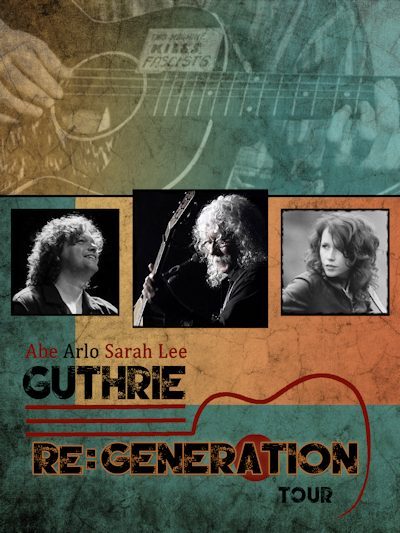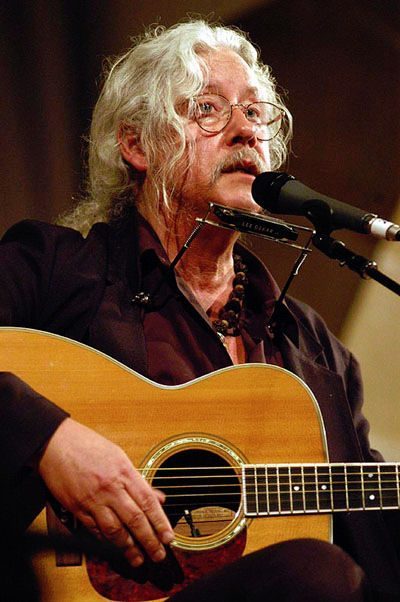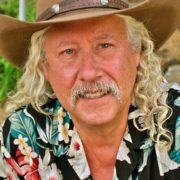ARLO GUTHRIE AT THE SABAN THEATRE
ARLO GUTHRIE AT THE SABAN THEATRE
With Sarah Lee and Abe Guthrie
April 5, 2018, 8:00pm
The Rolling Laughter Review
 The concert poster says it all: at the top you see Woody’s famous guitar, with four words that define his mission and stature as an artist: “This Machine Kills Fascists.” Beneath that you see a profile in courage~ of Arlo Guthrie, and to either side his daughter Sarah Lee and son Abe. It shows the flow of time down to three generations of Guthries since Woody~ and the title “Re: Generation Tour.”
The concert poster says it all: at the top you see Woody’s famous guitar, with four words that define his mission and stature as an artist: “This Machine Kills Fascists.” Beneath that you see a profile in courage~ of Arlo Guthrie, and to either side his daughter Sarah Lee and son Abe. It shows the flow of time down to three generations of Guthries since Woody~ and the title “Re: Generation Tour.”
So my question is who best captured the indomitable spirit of Woody last night? One would have thought going into it that it would be Arlo, but I’m not so sure. If you were looking for ghosts, the most haunting song of the evening was from Sarah Lee~ a tribute to her mom~ and Arlo’s wife Jackie whom they lost five years ago to cancer. Her song was inspired by something her own daughter—Arlo’s granddaughter—said on board a plane to another tour stop along the way. She looked up and said to Sarah Lee—“Do you see Nana up there?” looking at the sky. “What do you mean? Honey” Sarah Lee replied. Her daughter, “She’s an angel.” Playing along, Sarah Lee went on—“Oh, that’s a nice thing to say, honey.” “What do you mean, mom?” her daughter insisted~ “She’s really there.” Skeptical by her own disposition, Sarah Lee nonetheless prodded her again, “What is she doing up there?” “Mom~ she’s turning into a star.”
And that’s when Sarah Lee realized she was out of her depth, and had better just get out of her way and trust what her daughter saw and let it go at that. But out of this surreal conversation came this remarkable song for her departed mother—written in her own words—as if it was indeed her mother talking—reporting on her own death. Wow! Not exactly what you expect to hear at an Arlo Guthrie concert. You could sense Arlo’s eyes were shimmering too, as he commented afterwards how beautiful the song was—which fully captured the essence of “Re-Generation,” in bringing—if only for a few minutes—his beloved wife back to life. I can’t recall any concert that took you on that kind of passage through another dimension of time and space~ and right after the passing of physicist Stephen Hawking, who had devoted his life to putting us on speaking terms with the cosmos. It was an unspoken, unsung tribute to him as well~ how beautiful.
Arlo’s pride in two of his children was transparent throughout, as well as his own ancestors—both family and spiritual kinfolk like Pete Seeger—whose Hudson River song Sailing Down My Golden River opened the concert~ played on his 12-string.
Arlo would come back to Pete later, but at the beginning he had another ghost to acknowledge, when he formally welcomed the audience to the show. He reminisced that the last time he had been at the Saban Theatre was to celebrate Theodore Bikel’s 90th birthday~ a memorable evening reviewed in these pages,
The audience applauded in memory of Theo and for Arlo’s having been a part of it. Now that both Pete and Theo are gone~ whose birthdays are only one day apart, May 3 and May 2~ Arlo is the last of the Three Musketeers~ the only real torch-bearer left of the great folk tradition emanating out of his father Woody, Pete and Lead Belly~ whose Midnight Special Arlo sang with power, enthusiasm and a beautiful introduction for Huddie Ledbetter—the King of the 12-String Guitar.
Arlo celebrated them all during the evening, beginning with his father Woodrow Wilson Guthrie. As the redoubtable president was busy amassing National Guard troops along our southern border—which he mistakenly referred to as “the military,” as if he were calling up the army in defiance of American law going back to Reconstruction—when the Posse Comitatus Act of 1878 forbid the U.S. military from being used within our own borders—a law Trump had never heard of until his ignorant threats prompted both the Pentagon to walk it back within five hours and American media to go back to their own history books and remind him that all he could do was request state governors to mobilize the Guard—which are under state —not federal authority. The last time they were mobilized in California was in 1992 to keep the Los Angeles streets safe during the L.A. Riots. Now the president wants them at the border to assault a caravan of a hundred Central American refugees.
Without any direct politicizing~ permitting me to read between the rhymes~ Arlo let his father’s 1948 song Plane Wreck at Los Gatos~ or Deportee~ with music by Martin Hoffman, do all the talking:
Goodbye to my Juan
Goodbye Rosalita
Adios mi amigos
Jesus y Maria
You won’t have a name when you ride the big airplane
All they will call you will be deportee
It is a perfect example of what Woody meant when he said, “This Machine Kills Fascists.” How many sixty-year-old songs sound as timely today as when they were written?
Some of us are illegal
and others not wanted
our work contract’s out and we have to move on
six hundred miles to the Mexican border
They chase us like rustlers, like outlaws, lie thieves.
Says Arlo: “Funny how the old songs hold up when you need ‘em from time to time.” Bravo!
At the time Woody wrote it no one knew the names of the 28 immigrant workers who perished in the downed plane. Folkways Moe Asch kept track of such stories and passed them on to Woody if he thought they might inspire a song. But it wasn’t the plane crash and loss of life that inspired Woody’s song~ it was a casual comment from a bystander reported at the scene; when asked if anyone had died in the crash, he replied, “Oh no, nobody died~ it was just a bunch of deportees on the plane.” That’s what inspired Woody to commemorate them. Not having their real names he made them up in the chorus—“Juan, Rosalita, Jesus and Maria” so they would have names to be remembered by. That is the job of a poet~ to name the world. But as luck would have it, and time would tell, fifty years later an LA Times reporter in concert with a surviving family member of the song’s victims begin to dig into the story with fresh eyes and new resolve. They eventually reconstruct the entire plane load of lost farm-workers (then disparaged as braceros and deportees), including the four crew members who went down in the plane wreck. And as Arlo reported last night they replaced the small generic stone placed nearby the original gravesite with a large stone that had all of their real names respectfully engraved on it—and then Arlo so movingly sums up the story—“as they should have done in the first place.” What difference can one song make? Woody’s single song restored the humanity to a symbol of American indifference to those with different colored skin than the white majority—a song that kept them alive with recordings by Judy Collins, Joan Baez, Pete Seeger and Arlo Guthrie—until three generations later a reporter and family member could make them rise again like Phoenix from the ashes of history—yet another example of Arlo’s tour title, “Re: Generation.”
 From Woody, Arlo comes to the most famous of “Woody’s Children,” Bob Dylan~ and a great story he came up with on the spur of the moment when he landed in Tucson, Arizona in the early 1980s. No sooner had he descended from the airplane onto the tarmac than a reporter put a microphone in front of him and shouted, “Arlo Guthrie, you are doing a concert here tomorrow night~ do you know that Bob Dylan is scheduled to do a concert here the same night as you?” Arlo did not know; the reporter continues, “My question is, ‘Why should anyone go and see you?’” Arlo didn’t miss a beat: “Well, if you want to hear some good old Bob Dylan songs, I guess you’ll have to come to my show!” (Rolling laughter) At the time Bob was into his Christian gospel period and not performing his old songs. To Arlo’s astonishment, he found his quote in the local paper the next morning~ which he had meant only as a joke. Now he was stuck~ he locked himself into his room with a Bob Dylan songbook and began to learn some of the songs he promised to do in Arizona. (Rolling laughter) The best of these songs in Arlo’s hands was Gates of Eden.
From Woody, Arlo comes to the most famous of “Woody’s Children,” Bob Dylan~ and a great story he came up with on the spur of the moment when he landed in Tucson, Arizona in the early 1980s. No sooner had he descended from the airplane onto the tarmac than a reporter put a microphone in front of him and shouted, “Arlo Guthrie, you are doing a concert here tomorrow night~ do you know that Bob Dylan is scheduled to do a concert here the same night as you?” Arlo did not know; the reporter continues, “My question is, ‘Why should anyone go and see you?’” Arlo didn’t miss a beat: “Well, if you want to hear some good old Bob Dylan songs, I guess you’ll have to come to my show!” (Rolling laughter) At the time Bob was into his Christian gospel period and not performing his old songs. To Arlo’s astonishment, he found his quote in the local paper the next morning~ which he had meant only as a joke. Now he was stuck~ he locked himself into his room with a Bob Dylan songbook and began to learn some of the songs he promised to do in Arizona. (Rolling laughter) The best of these songs in Arlo’s hands was Gates of Eden.
Then he pulls another song out of his hat (which he didn’t need last night, with his long curly grey-white hair rolling down his shoulders) ) and comments that the first time he heard Tambourine Man on the radio was a revelation to him. He had gone to Montana at the time, planning to create a different life for himself—as a forest ranger—far removed from society and crowds—which he confided he didn’t like. But when he heard Dylan on the radio he realized “something is happening~ and I better find out what it is.” Then he heard the Byrds sing Pete’s song Turn, Turn, Turn on the radio, and it dawned on him that folk music was here to stay—and he could perhaps make a little place for himself in that world. “The life I planned didn’t work out~ but this one has been a karmic disaster.” (Rolling laughter~) Then after mentioning that the Byrds had done only “half of this song,” because radio wouldn’t play anything longer than 2’30” at the time,” Arlo launches into a beautiful version of Tambourine Man—on his big blue 12-string guitar in drop “D” tuning and harmonica~ just incandescent—and all four verses.
As beautiful as it was, he wasn’t done with Bob. He suddenly pulls out all the stops and goes back to 1964 for The Times, They Are a-Changing. This may be a wake-up call to Bob, for his next Rolling Thunder Review, since he stopped performing it after he wrote his Oscar-winning jaded response to it, “Things Have Changed,” (“I used to care, but things have changed.” History may finally have caught up with the decade of change, and brought a new one upon us. For the swan song of Parkland, Florida’s high school students’ “March For Our Lives” last March 24 that brought a half million people to Washington, D.C. to put gun control back into the national debate was none other than Bob Dylan’s rallying cry for the 1960s, “The Times, They Are a-Changing,” which Jennifer Hudson transformed into a gospel song.
But the true moment of splendor for me was Sarah Lee—with almost all the lights turned off, and her guitar silent, a cappella, singing her grandfather’s great anti-Korean War song, I’ve Got to Know,
Why do your war ships sail on my waters
Why do your death bombs fall from my skies?
Tell me why do you burn my farm and my town down
I’ve got to know, friend, I’ve got to know.
Chorus:
I’ve got to know, yes, I’ve got to know
Hungry lips ask me
Wherever I go
Comrades and friends all falling around me
I’ve got to know, yes, I’ve got to know why.
She rewrote the final verse, in the wake of two more recent police shootings of black men~ one right up here in Sacramento with the killing of Stephon Clark being shot seven times in the back, while holding his cell phone they mistook as a weapon, in his grandmother’s backyard. Sarah sings,
What made your cop kill my brothers and sisters
You have to talk plain
’Cause I sure have to know!
You can hear a pin drop during her performance. It is breathtaking, and captures Woody’s take no prisoners’ spirit.
Sarah Lee follows this with another of Woody’s children~ Phil Ochs’ majestic secular hymn, When I’m Gone, with which Theo Bikel closed his 90th birthday concert Arlo mentioned in the beginning:
…No and I won’t see the golden of the sun when I’m gone
And the evenings and the mornings will be one when I’m gone
Can’t be singing louder than the guns when I’m gone
So I guess I’ll have to do it while I’m here.
That’s a song Woody would have been proud of, for it was Phil Ochs who said, “Ah, but in such an ugly time, the true protest is beauty.”
Arlo came back to give the audience what they came for—his greatest hits, Steve Goodman’s City of New Orleans, and Alice’s Restaurant, which just celebrated its 50th anniversary last year. He didn’t phone it in either—it was fully orchestrated with Abe grinning at the keyboards and his finger-style ragtime chord progressions in C on the 3rd fret and the funniest Thanksgiving story-song of all time, an account of his arrest for littering and his subsequent draft board physical in 1967. At 18’ 34” long Arlo suggests that it may be the only recording that perfectly matches Richard Nixon’s missing White House tapes~ rolling laughter and standing ovation.
Arlo sang it with just as much devilish delight as he sang it at Newport in 1967. And then, to cap off a wonderful concert, Arlo sings Woody’s This Land Is Your Land, “Because I heard Lady Gaga sing it during last year’s Super Bowl halftime show.” (Rolling laughter) Arlo Guthrie is a master storyteller, a great musician and America’s greatest humorist, my longstanding choice for the Kennedy Center’s Mark Twain Prize for American Humor, “Mark Twain with a guitar.” Bravo!!
With thanks to Luanne Nast of the Canyon and Saban Theatre for the press pass+1. Gordon Lightfoot comes to the Saban in their folk series Saturday, April 28, 8pm.
Ross Altman has a PhD in Modern Literature from SUNY-Binghamton; he belongs to Local 47 (AFM); Ross may be reached at greygoosemusic@aol.com













